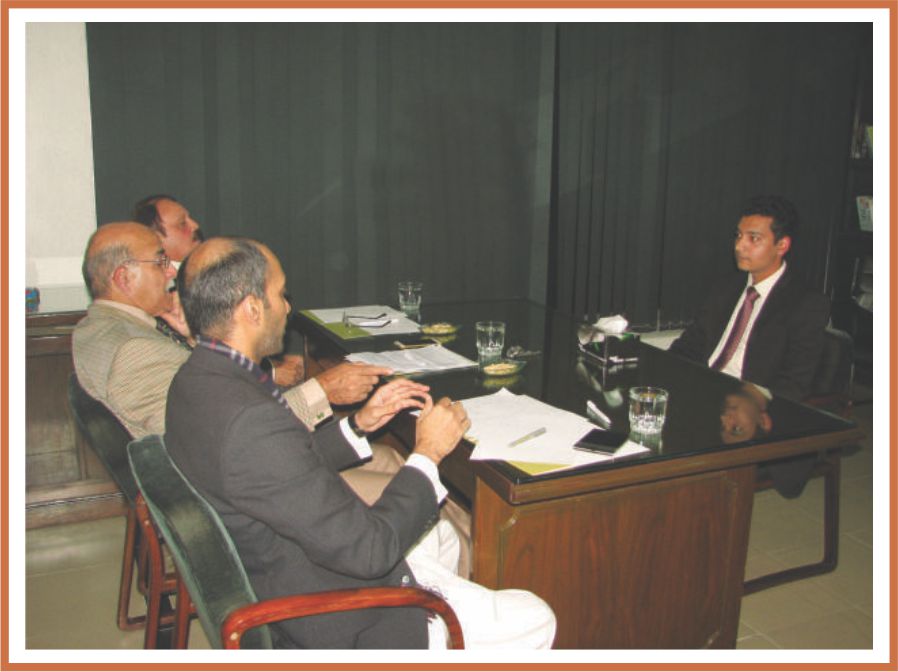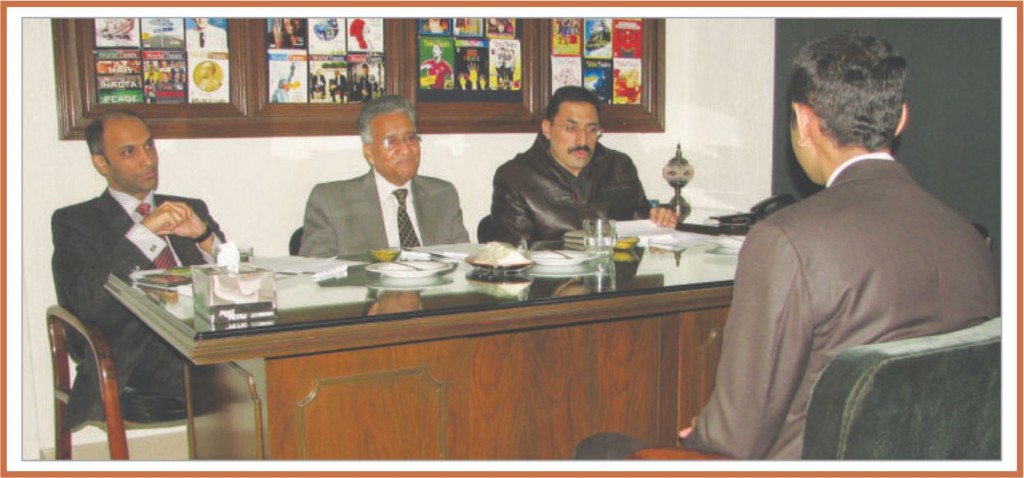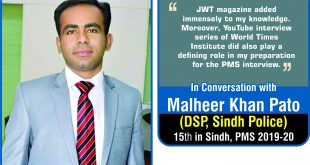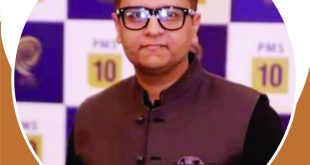Most Expected Questions
for
CSS, PMS Interviews
Zohaib Ahmed Anjum (PAS)
How to Introduce Yourself?
- Start by thanking the interviewer for giving you the opportunity to introduce yourself.
- Mention your full name (If Interviewer has addressed you with your name, don’t re-state your name)
- Mention your hometown or area you belong to.
- State your academic background. Start from the latest degree. Mentioning one or two degrees would suffice. Mention the name of your alma mater. If you have exceptional scores in that degree or a particular area, do mention that. Also specify the research project or conference papers, if any, you have authored or presented. You should also highlight extracurricular activities if you have any distinction in them.
- If you are serving, or have served, as a professional in any sector, mention your areas of expertise, your job description, and any extraordinary performance or contribution that you have rendered as part of that profession.
- Highlight your key strengths but those that you mention must fit-in. It should not be a random selection. Such strength should reflect upon professional, academic or intellectual aspects of your personality.
- Briefly talk about your family. You may start from mentioning your parents and brothers and sisters. You can highlight their professions or academic background. But do keep it short.
- You can also mention your hobbies, your favourite personality that has left imprints on your life.
- Close your introduction with an effective and powerful tone. You may also hint that you are ready to throw light on other aspects of your personal life as well.
Important Note: This sequence can be changed and improvised but remember that you must not commit any blunder in this part because it is your first interaction with the panellists. Although an ideal introduction should span 60 to 90 seconds, there is no definite timeframe. However, should neither be so lengthy that the panellists get exhausted nor should it be so short that they are forced to ask about different aspects that you were supposed to talk about.
- Pakistan could not come up with an effective and comprehensive political and strategic response to Indian moves in Indian-Occupied Kashmir. Why?
- India has huge reservations over CPEC projects in Kashmir. Why?
- UNO has failed Kashmir. Comment!
- What, do you think, could be the most effective strategy to deal with the challenges posed by recent Indian conflagration in IOK? Reprisal, retaliation, reconciliation or competition? What are the right options for Pakistan?
- Do you think Pakistan’s efforts at internationalizing Kashmir issue would yield any result?
- Is Pakistan diplomatically isolated in the region and in the comity of nations?
- What were Articles 370 and 35 A of the Indian constitution about? How would their revocation change the demography and status of Indian-occupied Jammu and Kashmir?
- With the revocation of Articles 370 and 35-A of the Indian constitution, and with the unionization of an otherwise disputed territory, India has been successful in de-internationalizing the Kashmir issue. Do you agree?
- Pulwama, Mumbai, Uri and Pathankot attacks were false-flag operations by Indians to render Kashmir insurgency ineffective, and to declare it a terrorist movement instead of a liberation movement. How do you see this aspect?
- Do you think Pakistan can afford a war with India at this moment? Is war with India an option?
- Curfew and communication blockade in Jammu and Kashmir warrants an international humanitarian response; otherwise a humanitarian catastrophe would be unfolding right in our backyard?
- Kashmir is a nuclear flashpoint. When Indian Defence Minister Rajnath Singh claimed that India may rethink its No First Use policy on account of a war with Pakistan and in the context of ISPR’s response, do you think relying on nuclear deterrence is a viable option for security and peace in South Asia?
- UAE confers highest civilian award “Order of Zayed” on Indian premier Modi. Does Pakistan need to reinvigorate its foreign policy ideals towards Arab world? Do you think Pakistan should recognize the state of Israel?
- How do you see relevance of OIC in the resolution of crises afflicting the Muslim world? What is OIC’s response on Indian atrocities in Kashmir?
- Do you think Trump was sincere in his offer of mediation between Pakistan and India?
- A muted response by United States to Indian clampdown in Kashmir valley has accorded India a much-needed international legitimacy on its human rights violations?
- While fate of Brexit hangs in limbo, this event has the tendency to sound death-knell to European integration. Do you agree?
- rexit would have far-reaching implications for Pakistan, Europe, the United States, global community and Britain as well?
- With the rise of populism, anti-immigrant sentiment, Islamophobia and anti-Semitism, Europe would have last nail in the coffin of its much-cherished and endeared principles?
- How do you see role of technology and globalization? Is it a stabilizer or a de-stabilizer? There are winners and losers. Do you agree?
- With the influx of digitization, robotics and artificial intelligence, what should be human response to the threat of job takeover and over-automation? What should be our intellectual and educations response?
- Certain regions of the world are doomed to stay poor and remain emerging. Do you agree?
- Where Latin American economies are headed?
- Can globalization be rescued from itself?
- Why United States chose a trade war with China? What could be its ramifications? Is there a possibility of a trade détente? Do you think this event has earmarked the reverse of globalization? Why did things go sour?
- Paris Climate Agreement was an overzealous attempt at mitigating the developmental wrongs of centuries. With American exit, this pact cannot meet its targets. Do you agree?
- Capitalism has faltered in bridging global economic insecurities. Does the world need another economic system?
- In Trump’s toolkit, “Withdrawal” is the only tool. Do you agree?
- Trump’s decision to pull out of peace talks with Taliban scheduled at Camp David was a strategic and diplomatic blunder. Comment?
- Even if the US and NATO troops withdraw, Afghanistan would not see peace any time soon? How a peace framework should be carved to make such armistice a sustainable reality?
- Qatar peace process shows that Taliban have won in Afghanistan. Yes or No?
- Why is China interested in Afghanistan? Do you think that Pakistan-Afghanistan-China trilateral engagement can deliver what Qatar peace process could not?
- With the US exit, Global War on Terror comes to an end, and world order undergoes a paradigm shift. Comment!
- How do you see Pakistan Afghanistan relations in a post-withdrawal Afghanistan? Do you think history would repeat itself and like the end of Cold War, this time again, Afghanistan would be embroiled in the flames of another civil war?
- Do you think Gwadar port and CPEC would serve as lynchpin of regional development and connectivity?
- CPEC’s western route and Gwadar port is not a delusional lullaby to Balochistan’s problem rather these projects have the potential to redefine the economic trajectory of under-privileged Baclochis. Comment?
- Do you think that our state’s counter-insurgency response in Balochistan and erstwhile FATA has been successful?
- What are the administrative, constitutional, political, and financial challenges to the merger of FATA with Khyber Pakhtunkhwa?
- With FATA merger, Zarb e Azb, NAP and fencing of western border, Pakistan has finally been able to win war on terrorism within its confines. Do you agree to the statement?
- Civil-military equation in Pakistan remains an unresolved conundrum?
- What is your panacea for Pakistan’s economy?
- Reflect upon state of Pakistan’s economy?
- Mantra of reforms sounds fanciful but it is never easy to revisit existing protocols, procedures, and status quo when institutions are highly politicized?
- How do you see current government’s efforts at taxation reforms and broadening of tax base? Do you think Pakistan would be able to attain its taxation targets? If not, why not? If yes, How?
- Karachi is an orphan child of a beleaguered state. Garbage is engulfing urban life in this metropolis of Pakistan. What is the way forward?
- Urban flooding in recent times have exposed the in-efficiency and incapacity of our municipal and city authorities. How would you go about it?
- Pakistan is one of the most vulnerable countries to the climate change. Comment?
- What solution would you offer to Pakistan’s water crisis?
- Indian government in recent years have announced to annul Indus Water Treaty. Can India really do so? What remedies does Pakistan have?
- With the unionization of Kashmir, India has worsened Pakistan’s water crisis. Comment?
- What is solution to the stunted growth in our children while we remain self-sufficient in food production?
- How do you see the future of CPEC in changing geo-political environment? Do you think this project is what we think it is? Would this project materialize. If yes, how? If not, Why?
- CPEC is Chinese imperialism in an aesthetic wrapping. Internally it is a bare manifestation of realpolitik of Communist Party of China?
- How do you see Indian and US concerns about CPEC? What would you make of certain Indian exhortations that CPEC would make Pakistan a Chinese colony?
- What was USA against IMF’s granting of a bailout package to package?
- How do you see the impact of US-China trade war on Pakistan and global economy?
- It is now China, which holds the keys to globalization and it has restored the mantle of neo-liberal economic policies despite a protectionist and regressive America rolling back on its own principles?
- How do you see prospects of India-Pakistan rapprochement under Modi-led BJP?
- Modi’s Hindutva policies are inspired by RSS ideology. Comment?
- Can Pakistan win a war with India?
- What do you know about Pakistan’s nuclear deterrence and striking capabilities?
- Should Pakistan leave IMCTC? Should we call off Raheel Sharif from the command of IMCTC?
- Can Pakistan act as a balancer and mediator between Iran and KSA?
- Saudi policies in Yemen amount to war crimes. What is your take on it?
- Iran is the real trouble-maker in Middle East. Argue?
- Would Syria under Bashar al Assad be any different from Syria under Hafiz Assad? Do you think in the post-Deash era, Syria would regain its lost strength and regional and international presence? How would Syria reconstruct itself? Is Syria bound to remain a Russian stooge and an Iranian proxy?
- Is IS defeated once and for all? How do you see prospects of its re-emergence? What is your take on idea of Imamate and Caliphate and its relevance as propagated by Abu Bakr al Baghdadi in modern times?
- Israel is in a state of constant war in Middle East?
- Israel in recent years has carried out attacks inside Syria, and Lebanon. It is constantly encroaching upon and expropriating Palestinian lands in West Bank and Jerusalem. It has committed human rights violations against un-armed Palestinians and international community remains a silent spectator to the sufferings of Palestinians. What is the solution of Palestine conflict?
- It is not an Arab-Israel competition, rather it is Iran-Israel competition. Comment?
- With the US withdrawal from JCPOA and slapping of economic sanctions on Iran, Iran is again on the path to nuclearization. Comment?
- Recent developments in Persian Gulf clearly suggest that US and Iran are heading toward an armed conflict. Do you agree? What could be the fallout of such an armed conflict?
- Why did Trump move US embassy to Jerusalem? Do you think that Jared Kushner’s peace plan would work for the resolution of Palestinian conflict?
- How would you evaluate overall security situation in Middle East?
- Do you think that recent attacks by Houthis on Saudi oilfields could lead to another war between Iran and Saudi Arabia like that of Iran-Iraq war?
- Can you remember a few wars fought in the Middle East? How these wars reshaped the Middle East as it is today?
- Do you think that CPEC, CASA-1000 and IPI can resolve Pakistan’s energy crisis?
- Give a brief account of overall security situation in Libya?
- What do you about the nature of conflict in Sahel region?
- Evaluate the impacts of terrorist and insurgent movements on the geo-political and geo-strategic situation in Middle East?
- What do you know about ETIM, IMU and their linkage to Uighurs of Xinjiang?
- What should be Pakistan’s reaction to China’s state oppression of 10 million Uighurs in Xinjiang Autonomous Region?
- How can SCO fight rise of terrorism in Central Asian Republics and Afghanistan?
- Do you think that SCO can serve as a security guarantor for Pakistan against Indian aggression?
- What do you know about BRICS and New Development Bank?
- What do you know about String of Pearls? Is it a buzz-word of global geo-politics?
- Do you think that rise of populists in Europe threatens European Union?
- Why is Brexit hanging in limbo? How an effective withdrawal from EU could be delivered? Do you think that UK government and Brexiteers should rethink their decision to withdraw form EU? Why?
- Immigration has transformed the facial and demographic contours of Europe. Comment?
- Although Warsaw Pact is long dead but even its shadows continue to haunt the security imagination of NATO. Comment?
- Catalonia, Vicegrad 4, and Brexit herald the onset of a new era for Europe. How do you see the future of European Union?
- Amazon paid the cost of global neglect. Comment?
- If Amazon dies, would civilization be able to survive. Comment?
- How do you see the American efforts at regime change in Latin America and intervention in the internal affairs of Latin American countries?
- The derivatives of Berlin Wall and Trump’s wall along border with Mexico might diverge but the essence, and the dogma are same. Comment?
- Why Trump lies? Why populist rhetoric has become a fashion for politicians in post-truth era?
- POTUS called for and re-negotiated NAFTA. What do you know about new trade liberalization arrangements between NAFTA members?
- How is PESCO different from NATO?
- What is RCEP and how it is different from TTIP?
- Differentiate between TPP and TTIP? Their fate?
- Do you think that NATO would be willing to shore up its defenses along Baltic states?
- America is paying for the security of Europe. How?
- Putin is out-beating NATO in every spheres of security?
- End of INF is the harbinger of another nuclear and missile race between USA and Russia. Do you agree?
- What makes Canada, Switzerland, Iceland, Finland, Norway and Denmark so peaceful states?
- Do you think that Pakistan would be able to revive its economy under IMF’s latest programme?
- Do you think that international community has failed Yemeni children?
- What would you say about legality of IMCTC and its actions in Yemen?
- Rohingya are just another addition in the bleak history of genocide, rape and ethnic cleansing. Comment?
- What are the implications of ICJ’s decision in Kulbhushan Jadhav’s case for Pakistan?
- Why was Pakistan ordered to pay 5.8 billion dollars to Tethyan Copper by ICSID?
- What would be the future of new world order in twenty first century? Multilateralism or Multipolarity?
- What would you make of economic prophets who are prophesizing another economic downturn in global economy?
- What would be the future of global commerce; platform economy or digital oligopoly?
- How do you see the future of democracy in the face of global regression and anti-democratic resistance?
- How would the world community manage the crisis of digital trust and digital combat?
- Do you think that “Clash of Civilizations” thesis was right in its projections?
- How do you see the future of global conflict?
- Brexit would be replicated world over. Comment?
- What is the nature of sanctions slapped on Iran?

Switching over to Civil Services
When you are already an engineer/doctor/ economist/Banker/educator/economist/doctor/lawyer, why do you want to pursue a career in Civil Services?
Again there is no universal response to this question and your reasoning might depend upon your perception of civil services and the profession you are already in. However, keep one thing always in mind: your response should not paint an idea that Civil Services is a better profession than engineering or any other. A more convincing answer could be the contextualization of your professional and career goals and drawing relativity, i.e. aligning your professional goals with CSS.
Another important reasoning that you can build your response upon for this transition could be the aspect of public service, empathy, belief in social change, meaningfulness of life and the lofty ideals that you cherish and the way you think CSS is the most effective platform for realizing those.
Another important reason can be drawing upon the interactions, integration and commonalities between the profession you are already in and civil administration like municipal challenges, infrastructure development, urban design, health, education and population planning.
Moreover, it can also be highlighted that in today’s time and age, the roles and responsibilities of public administrators have undergone huge shift. The professions are highly integrated now and due to the complexity of modern life; different professionals have to integrate. So we see graduate engineers getting degrees in business administration, statistical analysis, public policy, public health engineering and occupational health and safety. All these roles and responsibilities have to be performed by civil servants at some point in their career.
The reasoning can also be framed in accordance with your occupational group preference. You can also personalize your answer, stating your personal reasons or some anecdote from your life that convinced you to join civil services. Such a personalized response would have more impact when conjoined with the rational reasoning.
You can also mention that how in your thinking man’s perceptions of career progression, social prestige and idea of power evolves with time and you think that in your perception CSS is the right career for you.
Sample Answer: Civil Services offers the best prospects for contributing toward the change you believe in. The richness of diversity of experiences, vertical and horizontal career progression, versatility of tasks and duties assigned and the real essence of policy-making at the highest echelons of power are some of the features that were attractive for me.
For Foreign Degree-holders
- What brings you to Pakistan after getting a foreign degree?
First, the sphere of influence one can exercise in Pakistan is unparalleled to any position on which one might serve in an alien land. Civil service offers one the best opportunity to generate an impact in one’s home country that one can never imagine in any other country. Moreover, private sector or corporate sector may offer better incentives but they by no means are comparable to the intensity and extensity of services and tasks that I would be exposed to as a civil servant. Moreover, I believe that a lamp should first lit its own backyard. We all have responsibilities towards our country, our people, our society and our family. Serving in a foreign land, having even the best career might not serve me when my people might need me back in Pakistan.
Second aspect is the personality grooming and self-actualization. Civil service offers you a broader array of career mobility and job exposure that is possible neither in the private sector nor in any foreign country. So for me, it was the pursuit of my happiness. My happiness was back in home. I attained the foreign degree because it offered better learning opportunities and intellectual enrichment. But for the purposes of service, I am better back home.
 Jahangir's World Times First Comprehensive Magazine for students/teachers of competitive exams and general readers as well.
Jahangir's World Times First Comprehensive Magazine for students/teachers of competitive exams and general readers as well.




